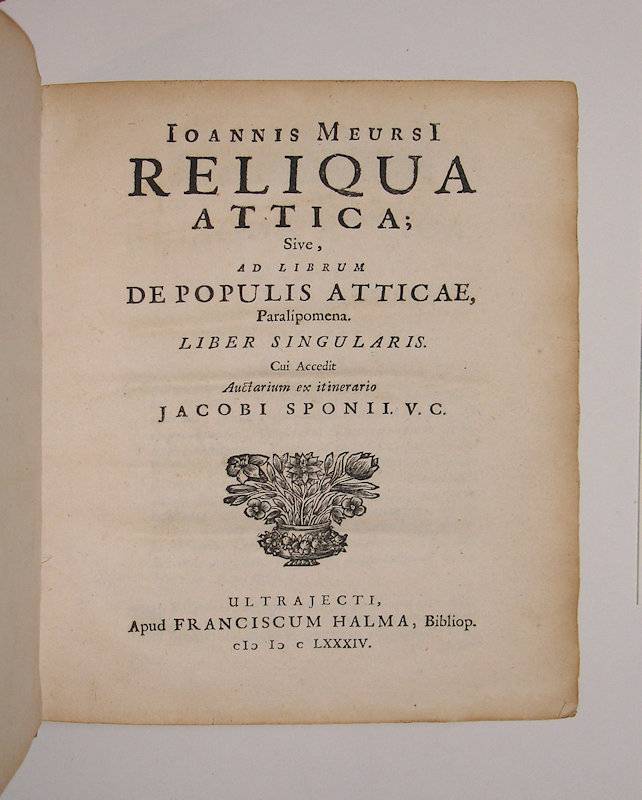MEURSIUS,J.
Ioannis Meursii Reliqua Attica; sive ad librum De populis Atticae Paralipomena. Liber singularis. Cui accedit Auctarium ex Itinerario (de Pagis Atticis) Jacobi Sponii. (Bound with:) Ioannis Meursii Theseus, sive de ejus vita rebusque gestis liber postumus. Accedunt ejusdem Paralipomena de Pagis Atticis, et Excerpta ex v.cl. Jacobi Sponii Itinerario de iisdem pagis. (And with:) Ioannis Meursii Themis Attica, sive De legibus Atticis libri II.
Ad 1 & 2: Utrecht (Ultrajecti), Apud Franciscum Halma, 1684. 3: Utrecht (Trajecti ad Rhenum), Apud Joannem vande Water, Joannem Ribbium, Franciscum Halma, 1685.
4to. 3 volumes in 1: 52,(8 index),40; (VIII),136,(12 index); (IV),152,(20 index) p. Vellum 20 cm (
Ref: STCN ppn 066811074; STCN ppn 066811007; STCN ppn 840519370; Haitsma Mulier/Van der Lem 334u & 334t) (
Details: 6 thongs laced through the joints. Short title calligraphed with black ink on the back. Title of 'Theseus' printed in red & black. Emblematic woodcut printer's device on the third title, depicting Ceres and Athena, labour and science, the motto is: 'vivitur in genio', 'only through his genius man survives') (
Condition: Vellum slightly soiled) (
Note: The Dutch classicist and historian Johannes Meursius (Johannes van Meurs), 1579-1639, was professor of History and Greek in the university of Leiden from 1610 till 1620. He studied under the genius J.J. Scaliger, and is best known for the 'editiones principes' of a number of Byzantine authors he produced, and the 'editio princeps' of the 'Elementa Harmonica' of Aristoxenus (1616). He edited also the 'Timaeus' of Plato with the commentary and translation of Chalcidius (1617). Meursius' indefatigable labours concerned also the history of ancient Greece, and especially Eleusis, and the antiquities of Athens and Attica. His work was widely used as a source by later ancient historians. Nothing that related to the history of Athens he left untouched, law, government, festivals, institutions, manners, literature, religion etc. The dazzling variety of titles of part of his pioneering work seems almost to exhaust the subject 'ancient Athens': De populis Atticae (1616), Atticarum lectionum libri VI (1617), Aeschylus, Sophocles, Euripides. Sive de tragoediis eorum (1619), Panathenaea. Sive de Minervae illo gemino festo (1619), Eleusinia. Sive, de Cereris Eleusinae sacro, ac festo (1619), Fortuna Attica. Sive, de Athenarum origine (1622), Archontes Athenienses. Sive, de ijs, qui Athenis summum istum magistratum obierunt (1622), Cecropia. Sive de Athenarum arce, & ejusdem antiquitatibus (1622), De ludis Graecorum (1622), Pisistratus. Sive, de ejus vita, & tyrannide (1623), Athenae Atticae. Sive, de praecipuis Athenarum antiquitatibus (1624), Areopagus. Sive, de senatu areopagitico (1624), Regnum Atticum. Sive, de regibus Atheniensium (1633), Reliqua Attica; sive, ad librum De populis Atticae, paralipomena (1684), Theseus, sive de ejus vita rebusque gestis (1684), Themis Attica sive De legibus Atticis (1685) It is manifest that Meursius with these works laid the foundations of much later learning.
§ The works in this convolute have been edited by J.G. Graevius, who has added at the beginning of the 'Theseus' a dedicatio to Carolus Sanctamauraeus, tutor of the Dauphin of France) (
Collation: A-G4, H2; 2A-E4; *4, A-R4, chiS4, S2; (after the last textpage of the Theseus (leaf R4) a gathering (chiS) with an 'Index rerum' has been inserted, before the 'Index auctorum' to which the catchword of R4-verso is referring. STCN errs in indicating S2 as chiS2); *2, A-X4, Y2) (Photographs on request)
Book number: 130111 Euro 600.00
Keywords: (Oude Druk), (Rare Books), Athen, Athens, Attica, Attika, Binding, Greek history, Meursius, antike altertum antiquity, griechische Geschichte
 MEURSIUS,J.
MEURSIUS,J.